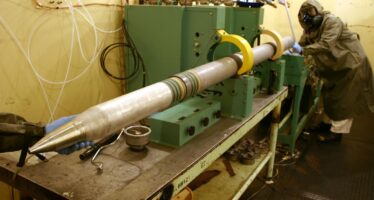Syrian civil war due to get much worse, ICG report says
![]()
TODAY’S ZAMAN, ?STANBUL
The International Crisis Group (ICG) has reported that worrying developments are increasing in Syria, underlining that the crisis will not easily fade out, but build up into a “more polarized and destructive civil war.”
“There are more than enough ominous trends… a regime seemingly morphing into a formidable militia engaged in a desperate fight for survival; an Alawite community increasingly embattled and persuaded its fate hinges entirely on the regime’s; and an opposition … threatened by its own forms of radicalization. Together, this could portend a prolonged, ever more polarized, destructive civil war,” the ICG stated in its Middle East Report released on Wednesday.
According to the report, the Syrian conflict followed by bloody clashes in the 17-month uprising was extensively influenced by the international community, but their efforts were no “more than inertia masquerading as motion.”
“Diplomatic maneuverings have ended up being little more than inertia masquerading as motion. The West used them to pretend it was doing more than it was; Russia exploited them to feign it backed the Syrian regime less than it actually did,” the report stated.
However, the crisis group experts do not consider the process to be too late, as international attitudes might change yet.
“A large-scale massacre or, more likely, regime use or loss of control of chemical weapons could trigger Western military action; Turkey or Jordan, alarmed at the rate of refugee inflows, could establish a safe haven in Syrian territory; in the event of Western intervention, Iran or Hezbollah could reciprocate on the regime’s behalf,” the ICG reported, meanwhile calling such a sequence of events “entirely hypothetical.”
“The bottom line at this stage is that the conflict will be sustained and influenced by outside parties but not determined by them. That unenviable role will fall on Syrians,” the ICG said.
Blaming the embattled Bashar al-Assad regime for Syria’s bloody uprising, the ICG report said that the regime had burned its bridges, “leaving it with neither [a] way back nor [a] way out.”
According to the report, social dynamics in Syria have evolved both for the better and for the worse. “The good was better than anticipated: a remarkably vibrant, courageous and resilient civil society that has mobilized networks of assistance and kept in check some of the worst forms of violence to which any armed opposition operating in a poisonous environment might have resorted,” the report noted, adding, “Syria’s opposition rediscovered a sense of solidarity, community and national pride.”
The bad involved features of sectarianism, fundamentalism, jihadi and foreign fighters which, according to the report, “the regime did its utmost to exacerbate.”
Noting several opposition groups have adopted an increasingly fundamentalist discourse, the report noted that from the start of the crisis, the gap between pro-opposition and pro-regime constituencies has grown exponentially. “Whether it be their perceptions of past, present or future, the two sides stand poles apart. Opposition circles tend to focus on the injustices perpetrated by a minority, Alawite-dominated regime; identify their current oppressors as mostly Alawite security forces,” the report noted, adding that the regime would pay a heavy price for the brutality carried out in the country.
The report also mentioned possible implications of the conflict. First, for the ICG, the outcome of the conflict will get much messier as the regime will not be able to suppress the armed groups. Secondly, nothing more should be expected from the regime as it does not bow to pressures and is not willing to compromise. Thirdly, the opposition should determine its relations with the regime in general, including the Alawites. “No single indiscriminate massacre of Alawites has yet to be documented, but given current dynamics one almost assuredly lies around the corner,” the report underlined.
Related Articles
Why the Iran Nuclear Talks Failed
![]()
Negotiating in Bad Faith The three day nuclear negotiations between Iran and the so-called P5+1 group of world powers that
América Latina durante la discusión sobre armas químicas en Siria del Consejo de Seguridad de Naciones Unidas
![]()
El 12 de abril del 2017, el Consejo de Seguridad sesionó nuevamente sobre la explosión de sustancias químicas ocurrida el pasado 4 de abril
In Rubio, Some See Rise of ‘Great Right Hope’
![]()
CORAL GABLES, Fla. — For many Tea Party conservatives, Hispanics, and young Americans frustrated with the national debt that baby boomers



